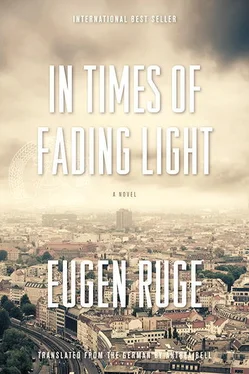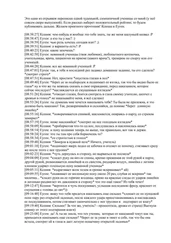Only the dining corner was still as it used to be. Although not entirely… it was true that Kurt hadn’t touched the wood veneer wall covering—Irina’s pride and joy, real wood veneer on the walls! Even the jungle of souvenirs (Russian Irina’s word for it when she really meant jumble) was still there, but not exactly as it had been. When the room was redecorated, Kurt had dismantled the wildly proliferating collection of souvenirs that had spread over the wood veneer walls for years, dusted the various items, chose “the most important” (or what Kurt thought the most important), and arranged them back on the wood veneer walls “in casual order” (or what Kurt thought was casual order). In the process, he had tried to make “functional” use of the holes for nails already present. It was Kurt’s aesthetic of compromise. And that was exactly what it looked like.
Where was the little curved dagger that the actor Gojkovic—who, after all, used to play the big chief in all those Indian films from the DEFA state-owned film studios!—had once given Irina? And where was the Cuban plate that the comrades from the Karl Marx Works had given Wilhelm on his ninetieth birthday? Wilhelm, so the story went, had brought out his wallet and slammed a hundred-mark bill down on the plate, thinking that he was being asked for a donation to the People’s Solidarity welfare organization for senior citizens.
Never mind. Things, thought Alexander… they were only things, that’s all. And for whoever came here after him, just a heap of old junk.
He went across to Kurt’s study on the other and, so Alexander thought, more attractive side of the house.
It was not like the living room, where Kurt had turned everything upside down—he had even replaced Irina’s furniture, her beautiful old glass-fronted display cabinet had gone in favor of some horrible kind of fiberboard flat-pack unit; even Irina’s wonderful and always wobbly tele phone table had gone; and so had the wall clock. The absence of the friendly old wall clock was what Alexander held against Kurt most of all. Its mechanism whirred every hour and half hour, to show that it was still on duty, even if the case with the chime inside was missing. Originally it had been a grandfather clock, a longcase clock, but following a fashion of the time Irina had removed it from its tall case and hung it on the wall. To this day Alexander could remember going with Irina to collect it, and how Irina couldn’t bring herself to tell the old lady who was parting with the grandfather clock that its long case was really superfluous to requirements; he remembered how they’d had to ask a neighbor to help them load up the clock complete with the entire case, and how that huge case, which they were taking away only for the sake of appearances, stuck out of the trunk of the little Trabant, so that in front the car almost lost contact with the ground… well, unlike the totally redecorated living room, in Kurt’s study all was still, in a positively ghostly way, as it used to be.
The desk still stood at an angle in front of the window—for forty years, every time the interior of the house was painted it had been put back on precisely the same pressure marks already left by its legs on the carpet. The seating corner with the large armchair where Kurt used to sit with his back bent and his hands folded, telling his anecdotes, was also the same as ever. So was the fitted Swedish wall unit. (Why Swedish, come to think of it?) Its shelves were buckling under the weight of books they held; here and there Kurt had fitted another shelf that didn’t quite match the color of the rest, but the cosmic order remained the same—a kind of final backup recording of Kurt’s brain: there were the reference works that Alexander himself had sometimes used (but mind you put them back!), here books on the Russian Revolution, there again a long row of the works of Lenin in their rust-colored brown bindings, and to the left of Lenin, in the last compartment of the wall unit under the folder sternly labeled PERSONAL, stood the battered folding chessboard—Alexander could have taken it out with his eyes closed—together with the chessmen carved at some time in the past by an anonymous inmate of the gulag.
All that had been added in forty years—apart from new books—were a few of what had originally been large quantities of souvenirs brought back from Mexico by Alexander’s grandparents. Most of them had been given away or sold in haste after their deaths, and even the few things with which Kurt, curiously enough, had not wanted to part hadn’t gained admittance to the “jungle”—allegedly for lack of space, in reality because Irina had never been able to overcome her hatred of anything that came from her in-laws’ house. So Kurt had “provisionally” found room for them on the fitted wall unit in his study, and there they had “provisionally” stayed to this day. Kurt had hung the stuffed baby shark from a hook on one shelf with gift ribbon—as a child, Alexander had been fascinated by its rough skin; the terrifying Aztec mask still lay, faceup, in the glass-fronted part of the unit containing all the little schnapps bottles; and the large, pink, spiral seashell into which Wilhelm had fitted an electric bulb—no one knew how—still stood on one of the lower shelves, although without any electrical connection.
Once again he thought of his son, Markus. Imagined Markus going around this house, in a hooded jacket and with headphones in his ears—that was how he had last seen him, two years ago—imagined Markus standing in front of Kurt’s book-lined wall and kicking the bottom shelves with the toes of his boots; imagined him handling the things that had been collected here, estimating their usefulness or saleability. Not many people would want to buy the works of Lenin from him; he might get a few marks for the folding chessboard. Probably only the stuffed baby shark and the big pink seashell would interest Markus himself, and he would take them home to his own place without giving much thought to their origin.
For a second he wondered whether to take the shell with him and throw it back in the sea where it had come from—but then the idea struck him as corny, like a scene in a TV soap opera, and he thought better of it again.
He sat down at the desk and opened the left-hand door of the storage space below the top of it. For the last forty years, the key to the wall safe had lain in the ancient photographic paper box right at the back of the middle drawer, hidden under tubes of adhesive—and it was still there (it had suddenly occurred to Alexander that the key might have disappeared, thus wrecking his plans, but that was a silly idea).
For safety’s sake, he put the key in his pocket—as if someone might yet try taking it away from him—and then sipped his cold coffee.
Strange how tiny Kurt’s desk was. Kurt had written all his works on that small surface. He used to sit here in a medically extremely unwise position, on an ergonomic catastrophe of a chair, drinking his bitter-tasting filter coffee, and hammering his works out on his typewriter by the hunt-and-peck method, tack-tack-tack-tack, Papa is working! Seven pages a day, that was his “norm,” but sometimes he would announce at lunchtime: “Twelve pages today!” Or, “Fifteen!” He had filled a complete section of the Swedish wall unit like this, shelving measuring one meter by three meters fifty, filled with the works of “one of the most productive historians of the German Democratic Republic,” as he had been described, and even if you took the articles out of the journals into which they were bound, and extracted the essays contributed to anthologies, and arranged them all in a row—together with the ten, twelve, or fourteen full-length books that Kurt had written—his writings still occupied a total expanse of shelving that could almost compete with the works of Lenin: a meter’s length of knowledge. Kurt had toiled away for thirty years to fill that meter of space, terrorizing his family all that time. Irina had cooked and done the laundry for the sake of that meter of space. Kurt had been awarded orders and decorations for that meter of space, but he had also earned reproofs and once even an outright reprimand from the Party; here he had bargained over the print run of editions with the publishing house, which was always contending with paper shortages, he had fought a running battle over phrasings and titles, had had to give in, or use cunning and persistence to achieve some measure of success—and now all of it, all of it was wastepaper.
Читать дальше












